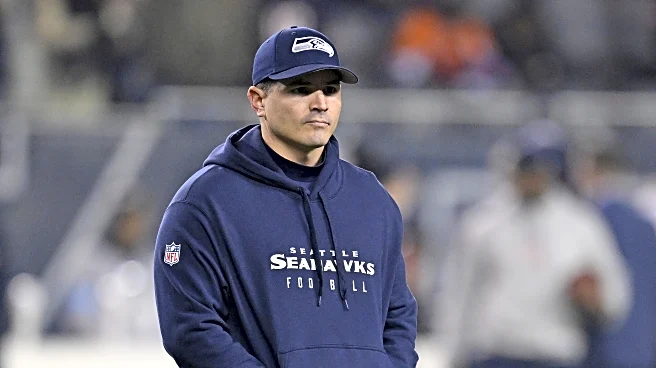What's Happening?
Tyler Perry's 'Beauty in Black' has claimed the top spot in Nielsen's Top 10 Overall Streaming chart for the week of September 15. The Netflix drama's second season garnered 1.354 billion viewing minutes,
demonstrating significant appeal among Black audiences, who constitute 52% of its viewership. Hispanic audiences have also shown increased interest, with their representation doubling from 14% to 31%. The show surpassed other popular titles, including Netflix's 'Wednesday,' which fell to third place with 1.022 billion viewing minutes. Other notable entries in the chart include 'Black Rabbit' and 'KPop Demon Hunters,' both from Netflix, and Prime Video's 'The Summer I Turned Pretty.'
Why It's Important?
The success of 'Beauty in Black' highlights the growing demand for diverse and inclusive content in the streaming industry. Tyler Perry's ability to attract a wide range of viewers underscores the importance of representation in media, potentially influencing future programming decisions by streaming platforms. The show's performance may encourage Netflix and other services to invest more in content that resonates with minority audiences, thereby expanding their subscriber base and enhancing viewer engagement. This trend could lead to broader cultural shifts in entertainment, promoting diversity and inclusivity across the industry.
What's Next?
As 'Beauty in Black' continues to perform well, streaming platforms may prioritize similar content that appeals to diverse demographics. This could result in increased production of shows and films that reflect varied cultural experiences, potentially reshaping the landscape of streaming entertainment. Additionally, other networks might seek to emulate Netflix's strategy by developing their own inclusive programming to capture a wider audience. The ongoing competition among streaming services could lead to innovative approaches in content creation and marketing, aiming to cater to the evolving preferences of viewers.
Beyond the Headlines
The success of 'Beauty in Black' may have broader implications for the entertainment industry, influencing how stories are told and who gets to tell them. As diverse narratives gain popularity, there could be a shift towards more authentic and varied storytelling, challenging traditional norms and stereotypes. This evolution might also impact hiring practices within the industry, encouraging the inclusion of more diverse voices in creative roles. Such changes could contribute to a more equitable and representative media landscape, reflecting the diverse society it serves.











